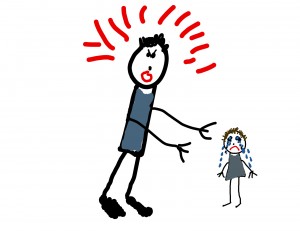Receive your FREE Parenting Advice through this blog. Simply ask Bob Lancer your question and receive his Lancer’s Answer in this blog.
Any anger that you exhibit in response to your child’s behavior works against you and against your child.
To find this out for yourself, closely observe how your child responds, in subtle and obvious ways, to your expressions of anger, frustration, impatience, annoyance and exasperation.
You will soon observe, through your child’s facial expressions, body language, and through your child’s behavior, that your angry reactions lower your child’s self-esteem and self-confidence and causes your child’s behavior to worsen.
Also notice how your angry reactions to your child’s behavior impact you. You will find that they drain you of energy, lower your morale, make parenting unpleasant (if not torturous at times), and makes you more irritable and less effective in every other area of your life, including marriage. If you react with anger on a routine basis you will also see that it negatively impacts your health.

Irresponsible angry responses can lead to behavior problems
Once you recognize that your reaction is not working, you can change it. But changing your behavior requires that you first take total responsibility for it. As long as you blame your child, or your child’s behavior, for the way that you behave, you continue giving your child the power to make you react.
As long as you believe that you have no choice but to react in the same old way to the same old problems, your belief keeps you trapped in those old reactions, and those old reactions keep re-creating the same old problems.
Improving your response to your child’s behavior begins with taking total responsibility for your responses and maintaining the open-minded attitude that you can always find a better way.
To begin improving the quality of your experience and your results in parenting, reject any belief that tells you that you cannot change, or that you need your child’s behavior to change before you can change what you do and how you feel about your child’s behavior.
So the most important key is to be aware in the now. You have to notice what you are doing, how you are feeling, and even what you are believing in the present moment to make better choices for better results.
As you become more aware of how you are responding to your child’s behavior, and to the results of those responses, you will find ways to improve your child’s behavior and your parenting experiences.
Receive your FREE Parenting Advice through this blog. Simply ask Bob Lancer your question and receive his Lancer’s Answer in this blog.





 button.
button. 































